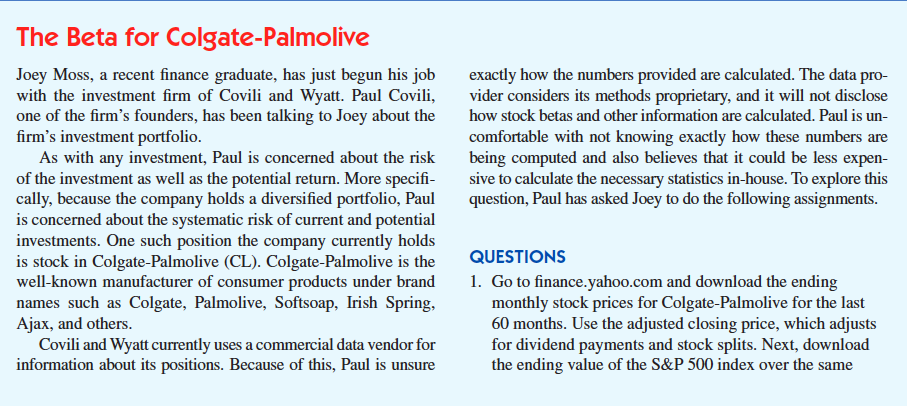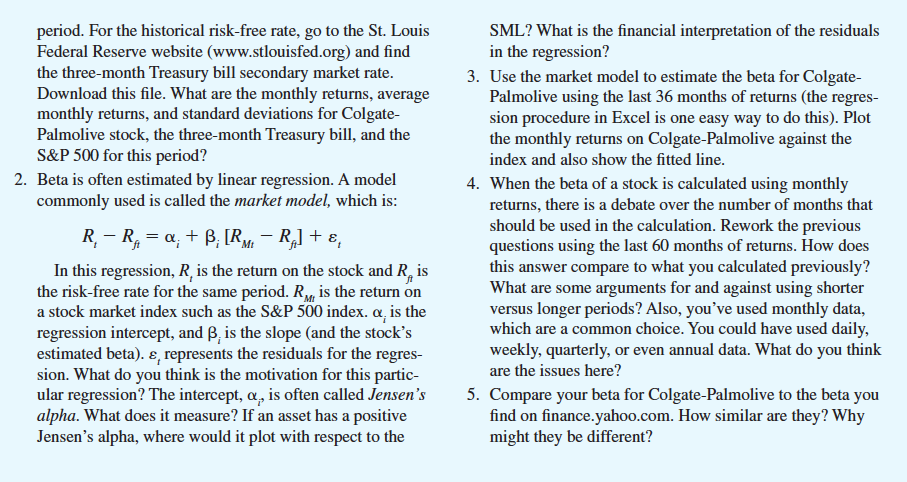Answered step by step
Verified Expert Solution
Question
1 Approved Answer
I want to ask the 1,3,4,5 questions. The Beta for Colgate-Palmolive exactly how the numbers provided are calculated. The data pro- vider considers its methods


I want to ask the 1,3,4,5 questions.
The Beta for Colgate-Palmolive exactly how the numbers provided are calculated. The data pro- vider considers its methods proprietary, and it will not disclose how stock betas and other information are calculated. Paul is un- comfortable with not knowing exactly how these numbers are being computed and also believes that it could be less expen- sive to calculate the necessary statistics in-house. To explore this question, Paul has asked Joey to do the following assignments. Joey Moss, a recent finance graduate, has just begun his job with the investment firm of Covili and Wyatt. Paul Covili, one of the firm's founders, has been talking to Joey about the firm's investment portfolio. As with any investment, Paul is concerned about the risk of the investment as well as the potential return. More specifi- cally, because the company holds a diversified portfolio, Paul is concerned about the systematic risk of current and potential investments. One such position the company currently holds is stock in Colgate-Palmolive (CL). Colgate-Palmolive is the well-known manufacturer of consumer products under brand names such as Colgate, Palmolive, Softsoap, Irish Spring, Ajax, and others. Covili and Wyatt currently uses a commercial data vendor for information about its positions. Because of this, Paul is unsure QUESTIONS 1. Go to finance.yahoo.com and download the ending monthly stock prices for Colgate-Palmolive for the last 60 months. Use the adjusted closing price, which adjusts for dividend payments and stock splits. Next, download the ending value of the S&P 500 index over the same period. For the historical risk-free rate, go to the St. Louis Federal Reserve website (www.stlouisfed.org) and find the three-month Treasury bill secondary market rate. Download this file. What are the monthly returns, average monthly returns, and standard deviations for Colgate- Palmolive stock, the three-month Treasury bill, and the S&P 500 for this period? 2. Beta is often estimated by linear regression. A model commonly used is called the market model, which is: R-RA= a; + B; [RME RA] + , In this regression, R is the return on the stock and R, is the risk-free rate for the same period. Ry is the return on a stock market index such as the S&P 500 index. a, is the regression intercept, and B. is the slope (and the stock's estimated beta). e represents the residuals for the regres- sion. What do you think is the motivation for this partic- ular regression? The intercept, a, is often called Jensen's alpha. What does it measure? If an asset has a positive Jensen's alpha, where would it plot with respect to the SML? What is the financial interpretation of the residuals in the regression? 3. Use the market model to estimate the beta for Colgate- Palmolive using the last 36 months of returns (the regres- sion procedure in Excel is one easy way to do this). Plot the monthly returns on Colgate-Palmolive against the index and also show the fitted line. 4. When the beta of a stock is calculated using monthly returns, there is a debate over the number of months that should be used in the calculation. Rework the previous questions using the last 60 months of returns. How does this answer compare to what you calculated previously? What are some arguments for and against using shorter versus longer periods? Also, you've used monthly data, which are a common choice. You could have used daily, weekly, quarterly, or even annual data. What do you think are the issues here? 5. Compare your beta for Colgate-Palmolive to the beta you find on finance.yahoo.com. How similar are they? Why might they be different? The Beta for Colgate-Palmolive exactly how the numbers provided are calculated. The data pro- vider considers its methods proprietary, and it will not disclose how stock betas and other information are calculated. Paul is un- comfortable with not knowing exactly how these numbers are being computed and also believes that it could be less expen- sive to calculate the necessary statistics in-house. To explore this question, Paul has asked Joey to do the following assignments. Joey Moss, a recent finance graduate, has just begun his job with the investment firm of Covili and Wyatt. Paul Covili, one of the firm's founders, has been talking to Joey about the firm's investment portfolio. As with any investment, Paul is concerned about the risk of the investment as well as the potential return. More specifi- cally, because the company holds a diversified portfolio, Paul is concerned about the systematic risk of current and potential investments. One such position the company currently holds is stock in Colgate-Palmolive (CL). Colgate-Palmolive is the well-known manufacturer of consumer products under brand names such as Colgate, Palmolive, Softsoap, Irish Spring, Ajax, and others. Covili and Wyatt currently uses a commercial data vendor for information about its positions. Because of this, Paul is unsure QUESTIONS 1. Go to finance.yahoo.com and download the ending monthly stock prices for Colgate-Palmolive for the last 60 months. Use the adjusted closing price, which adjusts for dividend payments and stock splits. Next, download the ending value of the S&P 500 index over the same period. For the historical risk-free rate, go to the St. Louis Federal Reserve website (www.stlouisfed.org) and find the three-month Treasury bill secondary market rate. Download this file. What are the monthly returns, average monthly returns, and standard deviations for Colgate- Palmolive stock, the three-month Treasury bill, and the S&P 500 for this period? 2. Beta is often estimated by linear regression. A model commonly used is called the market model, which is: R-RA= a; + B; [RME RA] + , In this regression, R is the return on the stock and R, is the risk-free rate for the same period. Ry is the return on a stock market index such as the S&P 500 index. a, is the regression intercept, and B. is the slope (and the stock's estimated beta). e represents the residuals for the regres- sion. What do you think is the motivation for this partic- ular regression? The intercept, a, is often called Jensen's alpha. What does it measure? If an asset has a positive Jensen's alpha, where would it plot with respect to the SML? What is the financial interpretation of the residuals in the regression? 3. Use the market model to estimate the beta for Colgate- Palmolive using the last 36 months of returns (the regres- sion procedure in Excel is one easy way to do this). Plot the monthly returns on Colgate-Palmolive against the index and also show the fitted line. 4. When the beta of a stock is calculated using monthly returns, there is a debate over the number of months that should be used in the calculation. Rework the previous questions using the last 60 months of returns. How does this answer compare to what you calculated previously? What are some arguments for and against using shorter versus longer periods? Also, you've used monthly data, which are a common choice. You could have used daily, weekly, quarterly, or even annual data. What do you think are the issues here? 5. Compare your beta for Colgate-Palmolive to the beta you find on finance.yahoo.com. How similar are they? Why might they be differentStep by Step Solution
There are 3 Steps involved in it
Step: 1

Get Instant Access to Expert-Tailored Solutions
See step-by-step solutions with expert insights and AI powered tools for academic success
Step: 2

Step: 3

Ace Your Homework with AI
Get the answers you need in no time with our AI-driven, step-by-step assistance
Get Started


